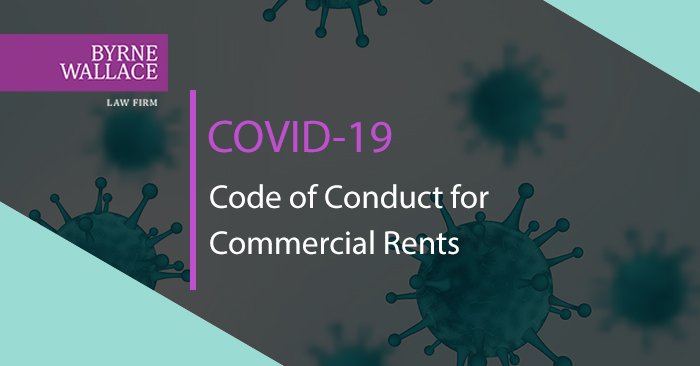COVID-19: Code of Conduct between Landlords and Tenants for Commercial Rents
Monday, 05 October 2020
A new Code of Conduct between Landlords and Tenants for Commercial Rents has been generally welcomed by the Irish retail sector, Chambers Ireland and the Banking and Payments Federation Ireland. The Code of Conduct is a voluntary Code which was developed by the Department of Business, Enterprise and Innovation following consultation with key stakeholders representing both landlords and tenants. It is intended to offer a framework for landlord and tenant negotiations concerning all commercial tenancies that have been seriously negatively impacted by the Covid-19 crisis, until 31 July 2021.
The Code of Conduct sets out a structured approach for engagement between commercial landlords and tenants, based on their mutual interest in working together to ensure that viable businesses can continue operating and landlords are not left with vacant premises that they may struggle to let in a challenged market.
The Code states that tenants who are in a position to pay in full should do so, and tenants experiencing temporary significant financial hardship as a result of the impact of COVID-19 should request assistance from their landlords. This approach would serve to encourage landlords to provide concessions to those tenants who are in greatest need. According to the Code, landlords should be willing to consider a reasonable case for some temporary concession where possible, having regard for their own financial responsibilities. Both parties are encouraged to engage with their lenders to seek flexible assistance in relation to their existing finance arrangements, where necessary.
Overarching principles
The Code sets out a number of principles:
- Transparency and collaboration – Landlords and tenants should act reasonably, swiftly, transparently and in good faith to identify and implement mutually beneficial solutions to the difficulties arising from COVID-19.
- Unified approach – Landlords and tenants should try to assist each other in their dealings with other stakeholders including government, utility companies and banks.
- Recognising supports – Where either landlord or tenant has received Government COVID-19 subsidies or reliefs, it should be recognised that such supports have been provided to help businesses meet their commitments. Landlords should seek to share any benefit arising from deferral of loan payments with tenants in a proportionate manner.
- Mediation – If, after following the principles, landlords and tenants cannot reach agreement, they may agree to use third party mediation to help facilitate negotiations.
Negotiations
Parties are required to act in good faith and in an open, honest and transparent manner. Tenants seeking new arrangements should provide sufficient and accurate financial information about their business and the premises and be clear as to why assistance is needed. Landlords should provide concessions where they reasonably can, having regard for their own obligations. Where a concession is refused, the landlord should set out a reasonable explanation for their decision, taking into consideration the information provided by the tenant.
Guidance is provided on issues to consider when determining the impact on both businesses of a request for a rent concession, including the impact of the closure period on the tenant’s business, ability to trade via other means and the tenant’s previous track record in relation to the lease.
To assist landlords and tenants to find solutions, a non-exhaustive list of options is set out in the Code. These include rent free periods, rent deferrals, splitting the cost of rent for the period that premises were closed and rent variations to market rent or turnover rent. Where a tenant occupies a number of units owned by the same landlord, rent reductions may be agreed across a portfolio of units. Compromise solutions include extending the term of the lease to cover the period of closure, and allowing landlords to draw from rent deposits on the understanding that the tenant will not be required to “top up” the deposit until it is reasonable to do so. It is recognised that the landlord may want to trade other benefits (such as removal of a tenant’s break option) for concessions.
Service Charge and Insurance
Acknowledging the ongoing need to insure and maintain buildings, the Code of Conduct advises that, unless otherwise agreed, service charge and insurance charges need to be paid in full. In some cases COVID-19 has resulted in additional service costs, to ensure full compliance with evolving health and safety requirements. Where practicable landlords should ensure that service charge costs are reduced and that any reduction in costs, such as local authority rates, are passed on to the tenants.
Using the Code
The Code of Conduct has no statutory basis and its operation is voluntary. It does not create any binding legal obligations except where both landlord and tenant agree to operate it. In other words, it does not of itself change any underlying legal relationship or commercial lease arrangements between landlords and tenants and any guarantors. Where new arrangements are agreed using the Code, or any commitment is contemplated to utilise the Code, legal advice should be sought in advance; especially on how to structure and document any concessions, to ensure that there are no unintended effects, for example upon future rent reviews or existing guarantees.
The Code is due to expire on 31 July 2021, but the Department of Business, Enterprise and Innovation has stated it will keep the Code under review and may extend or replace it if required.
If you wish to discuss any of the matters raised in this article, please contact Michael Walsh or Michelle McVeigh of our Property/Real Estate team, or your usual ByrneWallace contact.
Please note that the content of this summary does not amount to professional advice. Legal and tax advice should be sought in respect of specific queries. The COVID-19 situation is evolving rapidly and this update is provided on the basis of information available as at 5 October 2020.

